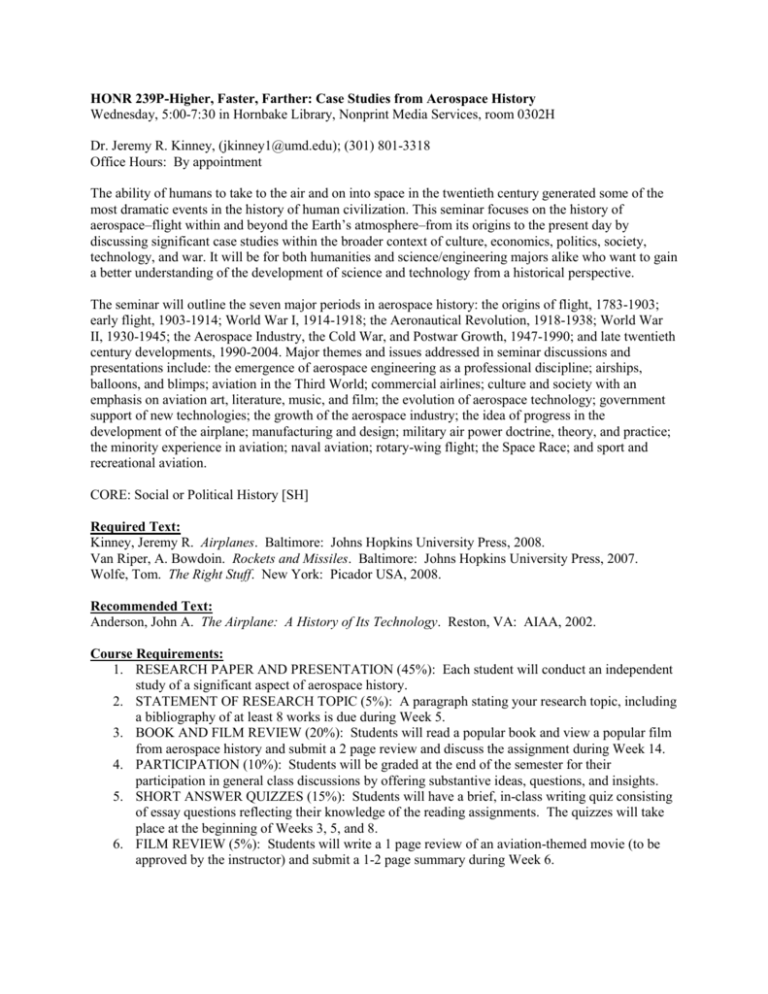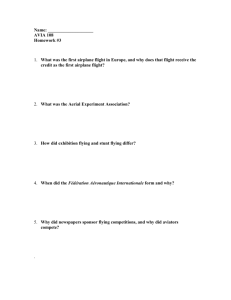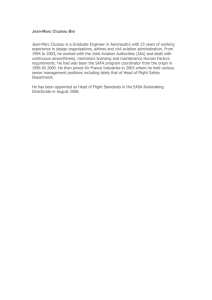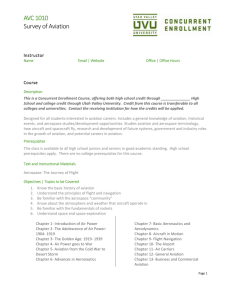HONR 239P Syllabus - University Honors
advertisement

HONR 239P-Higher, Faster, Farther: Case Studies from Aerospace History Wednesday, 5:00-7:30 in Hornbake Library, Nonprint Media Services, room 0302H Dr. Jeremy R. Kinney, (jkinney1@umd.edu); (301) 801-3318 Office Hours: By appointment The ability of humans to take to the air and on into space in the twentieth century generated some of the most dramatic events in the history of human civilization. This seminar focuses on the history of aerospace–flight within and beyond the Earth’s atmosphere–from its origins to the present day by discussing significant case studies within the broader context of culture, economics, politics, society, technology, and war. It will be for both humanities and science/engineering majors alike who want to gain a better understanding of the development of science and technology from a historical perspective. The seminar will outline the seven major periods in aerospace history: the origins of flight, 1783-1903; early flight, 1903-1914; World War I, 1914-1918; the Aeronautical Revolution, 1918-1938; World War II, 1930-1945; the Aerospace Industry, the Cold War, and Postwar Growth, 1947-1990; and late twentieth century developments, 1990-2004. Major themes and issues addressed in seminar discussions and presentations include: the emergence of aerospace engineering as a professional discipline; airships, balloons, and blimps; aviation in the Third World; commercial airlines; culture and society with an emphasis on aviation art, literature, music, and film; the evolution of aerospace technology; government support of new technologies; the growth of the aerospace industry; the idea of progress in the development of the airplane; manufacturing and design; military air power doctrine, theory, and practice; the minority experience in aviation; naval aviation; rotary-wing flight; the Space Race; and sport and recreational aviation. CORE: Social or Political History [SH] Required Text: Kinney, Jeremy R. Airplanes. Baltimore: Johns Hopkins University Press, 2008. Van Riper, A. Bowdoin. Rockets and Missiles. Baltimore: Johns Hopkins University Press, 2007. Wolfe, Tom. The Right Stuff. New York: Picador USA, 2008. Recommended Text: Anderson, John A. The Airplane: A History of Its Technology. Reston, VA: AIAA, 2002. Course Requirements: 1. RESEARCH PAPER AND PRESENTATION (45%): Each student will conduct an independent study of a significant aspect of aerospace history. 2. STATEMENT OF RESEARCH TOPIC (5%): A paragraph stating your research topic, including a bibliography of at least 8 works is due during Week 5. 3. BOOK AND FILM REVIEW (20%): Students will read a popular book and view a popular film from aerospace history and submit a 2 page review and discuss the assignment during Week 14. 4. PARTICIPATION (10%): Students will be graded at the end of the semester for their participation in general class discussions by offering substantive ideas, questions, and insights. 5. SHORT ANSWER QUIZZES (15%): Students will have a brief, in-class writing quiz consisting of essay questions reflecting their knowledge of the reading assignments. The quizzes will take place at the beginning of Weeks 3, 5, and 8. 6. FILM REVIEW (5%): Students will write a 1 page review of an aviation-themed movie (to be approved by the instructor) and submit a 1-2 page summary during Week 6. HONR 239P-Higher, Faster, Farther Grade Determination: Research Paper and Presentation Statement of Research Topic Book and Film Review Class Participation Short Answer Quizzes Film Review TOTAL 2 45% 5% 20% 10% 15% 5% 100% Important Policies: 1. TURNING IN ASSIGNMENTS—Assignments are due at class time on their due dates. I prefer electronic submissions. Please supply a stamped self-addressed envelope if you want hard copy assignments returned after the end of the semester. 2. MAKE-UP ASSIGNMENTS—If you have a family or medical reason for missing an in-class examination or the book discussions, you must contact the instructor before the date and have him consent to your absence if you wish to make up the work. 3. LATE ASSIGNMENTS—Unless you make other arrangements with the instructor, late papers will be penalized one full letter grade for each day of tardiness. 4. ACADEMIC ACCOMMODATIONS—If you have a documented disability, you should contact Disability Support Services 0126 Shoemaker Hall. Each semester students with documented disabilities should apply to DSS for accommodation request forms which you can provide to your professors as proof of your eligibility for accommodations. The rules for eligibility and the types of accommodations a student may request can be reviewed on the DSS web site at http://www.counseling.umd.edu/DSS/receiving_serv.html. 5. RELIGIOUS OBSERVANCES—The University System of Maryland policy provides that students should not be penalized because of observances of their religious beliefs, students shall be given an opportunity, whenever feasible, to make up within a reasonable time any academic assignment that is missed due to individual participation in religious observances. It is the responsibility of the student to inform the instructor of any intended absences for religious observances in advance. Notice should be provided as soon as possible but no later than the end of the schedule adjustment period. 6. ACADEMIC INTEGRITY AND THE HONORS COLLEGE—The University is an academic community. Its fundamental purpose is the pursuit of knowledge. Like all other communities, the University can function properly only if its members adhere to clearly established goals and values. Essential to the fundamental purpose of the University is the commitment to the principles of truth and academic honesty. Accordingly, the Code of Academic Integrity is designed to ensure that the principle of academic honesty is upheld. While all members of the University share this responsibility, The Code of Academic Integrity is designed so that special responsibility for upholding the principle of academic honesty lies with the students. All University of Maryland students are asked to write and sign the following Honor Pledge to all submitted assignments and exams: I pledge on my honor that I have not given or received any unauthorized assistance on this assignment/examination. The University of Maryland honor system is fully described in the Code of Academic Integrity. Please read: www.studenthonorcouncil.umd.edu/code.html. The Code is administered by an allstudent Honor Council. The student Honor Council office is located in room 2118 Mitchell Building and can be reached at 301-314-8204. The Honors College works to enrich its community life by promoting an atmosphere of honesty, trust, and mutual responsibility. In the event that an Honors College student is found responsible HONR 239P-Higher, Faster, Farther 3 for a violation of the Code of Academic Integrity by the Student Honor Council, he or she will be dismissed from the Honors College for the semester in which the violation took place and for all subsequent semesters in which the student is enrolled as an undergraduate at Maryland. 7. INCLEMENT WEATHER—In the event of inclement weather or an emergency that closes the University, the instructor will be in contact via e-mail for scheduling announcements. 8. 21st CENTURY TECHNOLOGY—No cell phone texting, instant messaging, e-mail correspondence, or any other form of non-class related communication or use of electronic technology will be tolerated during class meetings. 9. CourseEvalUM—Your participation in the evaluation of courses through CourseEvalUM is a responsibility you hold as a student member of our academic community. Your feedback is confidential and important to the improvement of teaching and learning at the University as well as to the tenure and promotion process. CourseEvalUM will be open for you to complete your evaluations for fall semester courses between Tuesday, December 1 and Sunday, December 13. You can go directly to the website (www.courseevalum.umd.edu) to complete your evaluations starting December 1. By completing all of your evaluations each semester, you will have the privilege of accessing the summary reports for thousands of courses online at Testudo. CORE-General Education Program CORE-General Education has both broad learning outcomes for the program as a whole and outcomes for each of the different CORE Distributive Studies categories. To see the Student Learning Outcomes for CORE, please visit: http://www.ugst.umd.edu/core/LearningOutcome.htm. No one CORE course will address all of the Learning Outcome Goals listed for its category. Some courses may contribute to general education in important ways not directly covered by the learning outcomes listed. This course falls is in the CORE category of Social and Political History (SH). Students should be able to: 1. Demonstrate knowledge of important findings and theories in social and political history; 2. Demonstrate understanding of investigative methods used in social and political history; 3. Demonstrate critical thinking about historical arguments and evaluate an argument’s major assertions, its background assumptions, the evidence used to support its assertions, and its explanatory utility; 4. Understand and describe change in history and historiography; and 5. Use appropriate technologies to conduct research on and communicate about social or political history and to access, evaluate, and manage information to prepare and present their work effectively. Schedule: Week 1 (2 September) Introductions and overview of the course Week 2 (9 September)-Origins of Flight; World War I Kinney, Introduction, Chapters 1-2 Van Riper, Introduction, Chapter 2 Week 3 (16 September)-The Aeronautical Revolution Kinney, Chapter 3 Van Riper, Chapter 3 Short Answer Quiz Week 4 (23 September)-World War II Kinney, Chapter 4 Van Riper, Chapter 4 Week 5 (30 September)—The Second Aeronautical Revolution & Postwar Military Aviation Kinney, Chapters 5-6 Van Riper, Chapters 5-6, 8, 10 Short Answer Quiz Paper Thesis and Bibliography Due HONR 239P-Higher, Faster, Farther Week 6 (7 October)-Commercial & General Aviation Kinney, Chapters 7-8 Film Review Due 4 Week 11 (11 November) Paper Presentations and Discussion (5) Week 12 (18 November) Paper Presentations and Discussion (5) Week 7 (14 October)-NO CLASS Group Viewing of The Right Stuff Week 13 (25 November)-NO CLASS Week 8 (21 October)-Space Age Van Riper, Chapters 7, 9 Short Answer Quiz Week 14 (2 December) Discussion of The Right Stuff Book and Film Review Due Week 9 (28 October) Paper Presentations and Discussion (5) Week 15 (9 December) Final Discussion Kinney, Conclusion Van Riper, Conclusion Final Papers Due Week 10 (4 November) Paper Presentations and Discussion (5) Research Paper Guidelines: Each student will conduct an independent study of a significant aspect of aerospace history that will generate an 8-12 page research paper, a fifteen- to twenty-minute class presentation, and a five-minute critical discussion afterwards. The project constitutes 45% of your final grade. Overall, the papers and presentations must stress the history of flight within a broader context, which includes perspectives on culture, economics, politics, society, technology, and war. You are required to use the Chicago citation format for endnotes as outlined in guides such as A Pocket Style Manual by Diana Hacker. Students can select topics from the list below on a first-come, first-serve basis that will begin during week 2. A paragraph stating your research topic, including a bibliography of at least 8 works is due during Week 5 and will count 5% of your final grade. Presentation and discussions will begin during Week 9. The final papers are due at the Week 15 class meeting. Lighter-than-air Flight, 1783-2003 Flight before Wilbur and Orville, 1799-1896 The French and the Birth of Flight The Aerial Age, 1908-1914 The First War in the Air, 1914-1918 The U.S. Government and the Airplane, 1920-40 Charles A. Lindbergh and American Aviation The Battle of Britain, 1940 The Air War in Europe, 1939-1945 The Air War in the Pacific, 1941-1945 The Enola Gay and the First Atomic Bomb The Minority Experience in Aviation The Culture of Aviation in the 20th Century The Turbojet Revolution, 1945-1960 The X-Planes and Flight Research, 1945-1990 The Air War in Korea The Air War in Vietnam Commercial Aviation Enters the Jet Age Private Flying in the United States A History of Gliding A History of the Helicopter A History of Aerodynamics A History of Aircraft Structures A History of Aircraft Propulsion A History of Aircraft Control The Race to the Moon, 1957-1975 America in Space, 1975-2001 A History of Rockets and Missiles, 1926-1957 The Culture of Spaceflight in the 20th Century The USSR in Space, 1958-1990 HONR 239P-Higher, Faster, Farther 5 Book and Film Review Guidelines: Students will read Tom Wolfe’s book, The Right Stuff, and watch the film, The Right Stuff in preparation for discussing both in detail in class and submitting a 2 page summary/comparison/review during Week 14. Student group viewings and discussions of the film will be during weeks 7. Otherwise, the film will be on reserve in the Nonprint Media Services for individual viewing. What to consider while writing the review: 1. What questions does the book/film seek to answer? 2. What’s the significance of the question? 3. What’s the main body of evidence? 4. Brief summary of the book and film. 5. Author’s conclusions. Beyond that, consider these points: 1. Gaps or weaknesses in logic or conclusion. 2. What further questions does the book invite? 3. When comparing with other books, how do these writers ask and interpret questions? How do they differ in how they ask their questions? Film Review: Students will write a 1 page review of an aviation-themed movie (to be approved by the instructor) due during Week 6. The main point of the exercise is to summarize the plot and place the film within an appropriate historical context (i.e., What does the film say about the time it represents as well as the time in which it was made?). Use the review guidelines provided to you for the book summary/discussion assignment as a model. Potential movies to review: Hell’s Angels (1930) Test Pilot (1938) Captains of the Clouds (1942) Strategic Air Command (1955) The Great Waldo Pepper (1975) Top Gun (1986) Memphis Belle (1944/1990) The Tuskegee Airmen (1995) October Sky (1999) Dark Blue World (2001) Sky Captain and the World of Tomorrow (2004) The Aviator (2005) Flyboys (2006) Sources: Aviation Movie List (http://www.geocities.com/CapeCanaveral/Hangar/6952/MOVIE.html) International Movie Database (http://www.imdb.com/) Turner Classic Movies (http://turnerclassicmovies.com) HONR 239P-Higher, Faster, Farther 6 INTRODUCTORY QUIZ—Week 1 What are the top 5 technologies of the 20th and early 21st centuries? 1.____________________________________________________ 2.____________________________________________________ 3.____________________________________________________ 4.____________________________________________________ 5.____________________________________________________ What are the top 5 events of the 20th and early 21st centuries? 1.____________________________________________________ 2.____________________________________________________ 3.____________________________________________________ 4.____________________________________________________ 5.____________________________________________________ What is “technology”? Historian of technology Melvin Kranzberg said, “Technology is neither good nor bad; nor is it neutral.” What do you think that phrase means? Who was the first to fly in the earth’s atmosphere? Who was the first to fly in space? Can you identify a significant craft from aviation and space history? Can you identify a significant individual from aviation and space history and discuss their importance to the history of flight? What do you think is the most important event in aerospace history and what is its importance to world history overall? When was the last time you flew in an airplane? Sketch your conception of an airplane and identify its major components:







